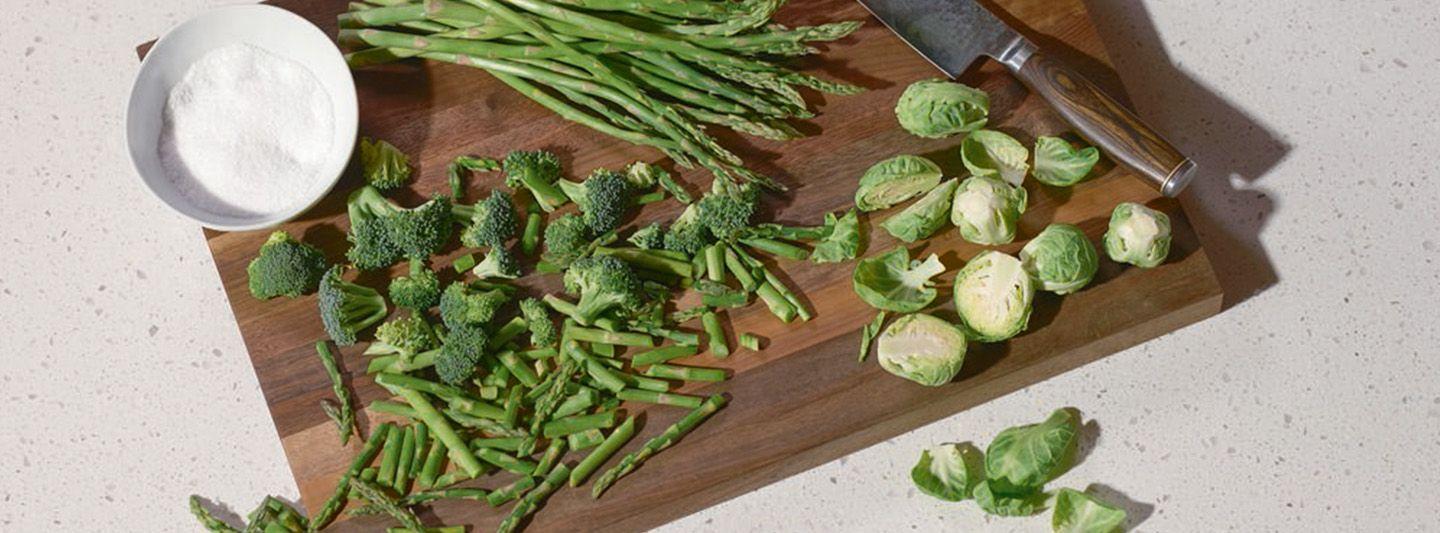Eat more greens for a healthy gut
Eating fruit and vegetables is great for the bacteria living in your gut that can support good health. Learn more about how greens help here.
Christina Stiehl,
Managing Editor
Pamela Nisevich Bede, MS, RD, CSSD, LD,
Medical Affairs
Published:
April 14, 2025
Updated:
April 29, 2025
Read time:
2 minutes

Start Lingo today for just $49
Learn how your body responds to food and exercise with a 2-week plan*, no commitment.
Buy now
Did you know that we have trillions of bacteria living in our gut? In fact, we have more bacteria in our gut than we have cells in our bodies.
The amount (and type) of bacteria, also known as gut microbiota, can affect everything from your mood to your digestion. 1
Probiotic “friendly” bacteria help keep your gut healthy by preventing the growth of unfriendly bacteria, which have been linked to health problems, including food allergies and inflammatory bowel disease. 2
Gut bacteria also play a key role in your digestive health and immune system. In addition, research suggests there may be a link between gut microbiota and body weight, as well as glucose regulation, factors that impact long-term health. 3,4
Help your good gut bacteria thrive
The balance of bacteria in your gut can be easily disrupted by things like stress, poor diet, illness, and drugs (like antibiotics).
Eating more produce, ranging from fruit to green vegetables (like leeks and asparagus) encourages the growth of good gut bacteria and better health outcomes. 5 These vegetables (and other foods like bananas, onions, and artichokes) contain a type of fiber called prebiotic fiber, which helps probiotic bacteria thrive.
Green vegetables are also a good source of dietary fiber, which keeps the digestive system healthy by promoting bowel regularity. Bacteria in the colon digest fiber by producing short-chain fatty acids (sometimes called postbiotics), which helps keep the cells in the colon healthy and stimulates the growth of good bacteria.
Emerging research suggests postbiotics may also help with control of glucose. 6 So, just one more reason to eat your greens.
A final note from Lingo
The bacteria living in your gut play a role in many areas of health, so keeping them happy can provide many benefits. Eating plenty of plant foods can provide the fiber needed to bolster probiotic bacteria and support gut health.
A continuous glucose monitor (CGM) like Lingo can help you see how eating different plant foods and fiber affects your glucose levels. You can use the personal data these devices provide to work out which foods might work for keeping your glucose steady.
The Lingo Glucose System is intended for users 18 years and older not on insulin. It is NOT intended for diagnosis of diseases, including diabetes.
The Lingo program does not guarantee that everyone will achieve the same results as individual responses may vary. Consult your healthcare professional before making changes to your diet or exercise regimen or if you have an eating disorder or a history of eating disorders.
© 2025 Abbott. All rights reserved. The biosensor shape and appearance, Lingo, and related brand marks are marks and/or designs of the Abbott group of companies in various territories. Other marks are the property of their respective owners.
ALB-02486
Published:
April 14, 2025
Updated:
April 29, 2025
Read time:
2 minutes


Christina Stiehl is the Managing Editor at Lingo. She graduated from the University of Missouri School of Journalism and has more than a decade of professional editorial experience in the health and wellness industry. Christina has written for top media publications including SELF, PS, Shape, Well+Good, Thrillist, and VICE before pivoting to leading content at health tech companies.


Pamela Nisevich Bede, MS, RD, CSSD, LD, is a certified specialist in sports dietetics and an expert in nutrition communications. Pam earned her Bachelor of Science degree in Dietetics from Miami University and a Master of Science in Medical Dietetics from The Ohio State University. While at Abbott Nutrition, Pam was the Global Nutrition Lead at Zone Perfect Nutrition and Ensure and was previously the Manager of Nutrition Marketing at EAS Sports Nutrition.
More to explore on the blog

Stuck in a food rut? Try something new
It’s easy to keep returning to the same familiar meals time and time again, but changing up your menu is great for your health. Learn more here.
April 28, 2025|2 minutes
How to stay steady and snack on the road
Keeping your glucose steady while you’re on the move can be tricky, but taking the right snacks with you can make a difference. Learn more here.
April 14, 2025|10 minutes
A healthy choice for your inbox
Sign up for Lingo emails to get science-backed tips, special offers, and The Journey Newsletter.
Start Lingo today
for just $49
Learn how your body responds to food and exercise with a 2-week plan*, no commitment.
- 1 Lingo biosensor with minute-by-minute glucose monitoring.
- Full access to the Lingo app.
- Available over the counter. No prescription needed.
- Works with iOS and AndroidTM
Shop now
Free shipping | 30-day money-back guarantee†
*No commitment. This plan does not auto-renew.
†30-day money-back guarantee is for first time purchases only

